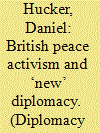| Srl | Item |
| 1 |
ID:
176162


|
|
|
|
|
| Summary/Abstract |
As the twentieth century dawned, fledgling transnational networks of peace activists, including the International Peace Bureau and the Interparliamentary Union, grew in prominence, not least in Europe. Impetus came from the United States, notably via the Lake Mohonk conferences and emergent organisations like the Carnegie Endowment for International Peace and the World Peace Foundation. Each group purported to speak on behalf of an inclusive and ‘international’ public opinion, yet men dominated them all. This analysis considers the challenge and sustainment to this male dominance in the period from 1880 to 1920, exploring the intersection between existing peace groups and an emergent feminist pacifism. Peace activists of all stripes believed that public opinion’s influence was growing, and most positioned themselves as representatives of an enlightened public sentiment; but the composition of this public sphere, and the space afforded within it for women, remained a site of contestation.
|
|
|
|
|
|
|
|
|
|
|
|
|
|
|
|
| 2 |
ID:
141959


|
|
|
|
|
| Summary/Abstract |
This analysis provides a re-appraisal of the 1899 Hague Conference by looking more closely at how citizen activists—notably in Britain but also transnationally—used it as a forum through which to press their agenda onto politicians and diplomatists. In so doing, this assembly existed as a stepping-stone between the ‘old’ diplomacy of the nineteenth century and the ‘new’ diplomacy of the twentieth. Peace activists identified and harnessed a growing body of progressive public opinion—on both a domestic and international scale—in the hope of compelling governments to take the necessary steps towards realising their ambitions of peace, disarmament, and international arbitration. Although the tangible outcomes of the 1899 Conference were limited, the precedents it established not only paved the way for further advances in international law, but also facilitated ever closer public and press scrutiny of international affairs into the twentieth century.
|
|
|
|
|
|
|
|
|
|
|
|
|
|
|
|
| 3 |
ID:
083104


|
|
|